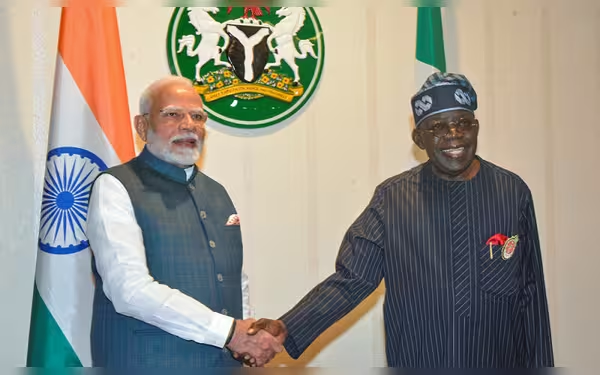Sunday, December 22, 2024 02:56 AM
Modi Strengthens India-Nigeria Ties During Abuja Visit
- Modi and Tinubu discuss strategic partnership.
- Focus on global challenges and cooperation.
- India invests $27 billion in Nigeria's economy.
 Image Credits: brecorder
Image Credits: brecorderModi's visit to Nigeria strengthens ties, focusing on cooperation and economic investments between the two nations.
In a significant diplomatic move, India’s Prime Minister Narendra Modi visited Nigeria, where he met with President Bola Tinubu to strengthen the ties between the two nations. This meeting, held in Abuja, marks a renewed commitment to what both leaders described as a "strategic partnership" between the largest democracy in the world and the largest democracy in Africa. Modi's visit is part of a broader tour that will also take him to the G20 summit in Brazil and Guyana.
The meeting was characterized by a warm welcome, with Modi being greeted by a military pipe band and an honour guard at the Nigerian presidency. The discussions took place at Aso Rock, the official residence of the Nigerian president, where both leaders engaged in closed-door talks. Modi emphasized the strength of their cooperation, stating, "Our cooperation is very strong and there are many new possibilities as well for us to take our cooperation forward." He highlighted the collaborative efforts of both nations in addressing global challenges such as terrorism, separatism, piracy, and drug trafficking.
During the visit, President Tinubu honored Modi with the Grand Commander of the Order of Niger, recognizing India's democratic achievements and expressing a commitment to work together based on "mutual respect and a shared mission." This gesture underscores the importance of the relationship between India and Nigeria, especially as both countries seek a more prominent role in global affairs.
One of the key topics discussed was the push for permanent representation on the United Nations Security Council. Both India and Nigeria are advocating for a more "multipolar" world, where countries from Africa, Asia, and Latin America are given greater representation alongside established powers like the United States, Russia, and China. Modi remarked, "Together we will also continue to highlight at a global level the priorities of the Global South," indicating a shared vision for the future.
Nigeria, with its population of 220 million, is the most populous country in Africa, while India, with 1.4 billion people, is the world's most populous nation. This demographic strength positions both countries as significant players on the global stage. However, Nigeria faces competition from South Africa in terms of diplomatic influence, particularly if the UN decides to increase representation for African nations.
In addition to political discussions, Modi's visit aims to enhance economic cooperation between the two countries. India has already made substantial investments in Nigeria, with over 200 Indian companies investing $27 billion in the Nigerian manufacturing sector. This investment has created numerous jobs and contributed to the local economy. Furthermore, Nigeria has benefited from Indian development funds, which include $100 million in loans and training programs for local workers.
As the world becomes increasingly interconnected, the relationship between India and Nigeria is poised to grow stronger. Both nations are navigating a complex landscape of global politics and economic competition, particularly in Africa, where various powers, including the United States, China, and Russia, are vying for influence. Modi's visit not only reinforces the ties between these two nations but also highlights the importance of collaboration in addressing shared challenges and seizing new opportunities.
The renewed partnership between India and Nigeria represents a significant step towards a more balanced global order. As both countries continue to advocate for their interests on the world stage, their collaboration could pave the way for a more equitable distribution of power and resources, benefiting not just their citizens but also the broader Global South.













